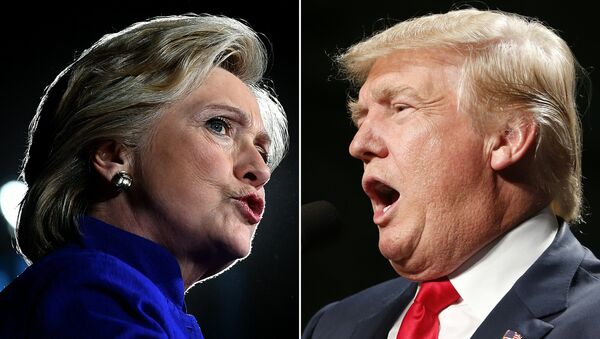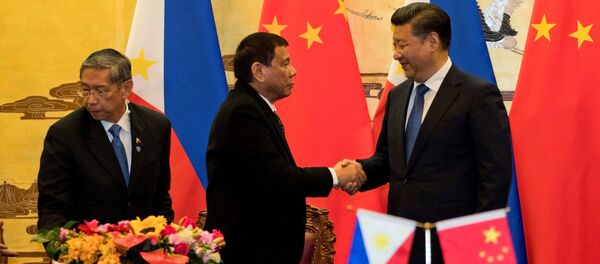The US wants return to Asia
During her campaign, Clinton has repeatedly stressed that the United States should strengthen its influence in Asia, in particular in the South China Sea, which is of strategic importance both for China and for the majority of Southeast Asian countries.
"The US has a deep and abiding interest in the South China Sea and to the free flow of commerce – so critical to our economy – that flows through it," she said in a campaign speech in New Hampshire.
Li Wei Jiang, director of the Institute of Foreign Policy at the Shanghai Academy of International Studies, is convinced that Clinton, as a proponent of the "pivot to Asia" and the use of "smart power," will continue the foreign policy course set by Obama.
"The aggressive anti-China policy in neighboring countries will not change. The US will recruit supporters in countries bordering China, especially in Southeast Asia. However, Clinton’s course will be opposed by China. In the confrontation over the South China Sea, the Philippines no longer wants to be an American pawn, and if the US does not find another pawn China and the US may take the path of direct confrontation, which can have dangerous consequences," the expert said.
Pierre Picquart, professor of geopolitics at Université Paris-VIII, believes that under Clinton, the US will most likely continue its policy of global influence.
"It will be a more interventionist and more unilateral international policy, showing the US desire to be present on all fronts," he said.
"By contrast, Trump’s policy is to reach agreements with major powers, including China and Russia, and come to terms with their leaders in order to divide geopolitical roles among themselves, as well as to ensure US security under a new balance of forces in the world. This policy carries a far smaller risk of conflicts," Picquart added.
Ba Dianjun, head of the International Relations Department at the Institute of Northeast Asia of Jilin University, believes Clinton will "strengthen military cooperation and tighten the military blockade policy, promote the militarization of diplomacy, and intensify military pressure."
The expert is convinced that under Trump the United States may turn to isolationism but that will also have negative implications for regional security.
True, Chinese experts have to take both candidates’ China-related remarks in stride. According to Li Wei Jiang, China is get used to hostile rhetoric in the US campaigns.
"As former State Council member Dai Bingguo used to say, so what? The time when China followed the US political lead in bilateral relations is history now. Gone are the days when China had to play according to the rules set in Washington," the expert said.
Zhan Li, director of the South Asia Institute at Sichuan University, said: "Hillary has vowed to surround China with elements of a missile defense system but I don’t think these plans are destined to materialize. First of all, the US does not have partners like Japan or South Korea in Central, South and Southeast Asia, nor are there such acute conflicts as the one that has evolved around North Korea’s nuclear program. It will be difficult for the United States to find a reasonable excuse or place to deploy its missile defense elements. India is also unlikely to join the blockade of China, because this is not in its interests."
At the same time, Hillary Clinton, who had extensive experience in conducting international talks as secretary of state (2009-2013), may be more effective than Donald Trump in resolving various conflicts as US president, experts say.
According to Michael Klare, director of Five College Program in Peace and World Security Studies (PAWSS) at Hampshire College, this applies primarily to one of the main regional problems — North Korea’s nuclear program.
"Hence, the next US president will be forced to consider new policy options. From what I can tell, Donald Trump has not given a lot of thought to this matter, except to suggest that it might be time for South Korea to acquire nuclear weapons of its own – something that would undoubtedly introduce fresh uncertainties into the region. Hillary Clinton would certainly consider tightening the already tight sanctions on North Korea, but this is not likely to have much effect unless China joins in, and she would have to find ways to persuade China to do that. So my guess is that she would explore bargaining moves that might entice China to put more pressure on Pyongyang – say, for example, a promise to halt deployment of the THAAD anti-missile system in South Korea," the expert said.
China’s preference for president
In the opinion of Mary-Françoise Renard, head of the Research Institute on Chinese Economy, Auvergne University, Clermont-Ferrand, even though Clinton will actively uphold US interests in Asia it will be easier for the Chinese government to find a common language with her than with Trump.
"The US has always wanted to play a central role in Asia, and China has tried to challenge that role. The US will continue to use tensions and conflicts in Asia to interfere in the relations between China and other Asian countries, which has never been to China’s liking. By the way, recently, Clinton has criticized China more actively than Trump over its human rights record, the yuan and its position on the South China Sea. But at the same time she insisted that relations with China are critically important to the United States. So I believe that China will be able to find a common language with Clinton," the French expert said.
Even many experts in China believe that it is better for Beijing to deal with a predictable Clinton than a rash Trump. According to Yu Wencheng, deputy general secretary of the Chinese Association of Periodical Publications on International Relations, Clinton is a more preferable candidate for China, since her political priorities are relatively predictable.
"It is more or less known what she will do while Trump is prone to reckless decisions, which can lead to great uncertainty in US-Chinese relations," the expert said.
Wang Yiwei, director of the Institute of International Studies at People’s University, believes that if she becomes president, Clinton will refrain from sudden moves in the Asia Pacific region.
"She will be cautious on TPP issues. At the same time she will pay considerable attention to meeting challenges to US security. So she is unlikely to exert pressure on China. The United States has been confronted with domestic economic problems that need to be addressed in cooperation with China. To all appearances, Clinton will not pursue a tough policy toward China. The US and China will cooperate," the expert said.
At the same time, if Trump wins, friction in US-Chinese relations will intensify. In his earlier campaign remarks, Trump threatened to punish China for manipulating the yuan.
Trump also urged US companies to scale down their operations in China.
"Apple and all of these great companies will be making their products in the United States, not in China, Vietnam," Trump said.
Possibly, much of his campaign rhetoric will soften if Trump gets to the White House.
"Attempts to blame China for all of the US’s economic problems not only will not help address these problems, but will also worsen the country’s economic situation. I believe that Trump as a businessman will be guided by common sense. Be it the issue of cyber security or trade deficit or the yuan – on all issues, it is essential to get back to the path of consultations. Cowboy-style politics cannot help tackle the challenging problems in US-Chinese relations," Li Wei Jiang said.
"On the whole, friction is possible if Trump wins, while a Clinton victory would mean an escalation of the confrontation in the strategic and security sphere cannot be ruled out," he said.






